-
 Bitcoin
Bitcoin $106,754.6083
1.33% -
 Ethereum
Ethereum $2,625.8249
3.80% -
 Tether USDt
Tether USDt $1.0001
-0.03% -
 XRP
XRP $2.1891
1.67% -
 BNB
BNB $654.5220
0.66% -
 Solana
Solana $156.9428
7.28% -
 USDC
USDC $0.9998
0.00% -
 Dogecoin
Dogecoin $0.1780
1.14% -
 TRON
TRON $0.2706
-0.16% -
 Cardano
Cardano $0.6470
2.77% -
 Hyperliquid
Hyperliquid $44.6467
10.24% -
 Sui
Sui $3.1128
3.86% -
 Bitcoin Cash
Bitcoin Cash $455.7646
3.00% -
 Chainlink
Chainlink $13.6858
4.08% -
 UNUS SED LEO
UNUS SED LEO $9.2682
0.21% -
 Avalanche
Avalanche $19.7433
3.79% -
 Stellar
Stellar $0.2616
1.64% -
 Toncoin
Toncoin $3.0222
2.19% -
 Shiba Inu
Shiba Inu $0.0...01220
1.49% -
 Hedera
Hedera $0.1580
2.75% -
 Litecoin
Litecoin $87.4964
2.29% -
 Polkadot
Polkadot $3.8958
3.05% -
 Ethena USDe
Ethena USDe $1.0000
-0.04% -
 Monero
Monero $317.2263
0.26% -
 Bitget Token
Bitget Token $4.5985
1.68% -
 Dai
Dai $0.9999
0.00% -
 Pepe
Pepe $0.0...01140
2.44% -
 Uniswap
Uniswap $7.6065
5.29% -
 Pi
Pi $0.6042
-2.00% -
 Aave
Aave $289.6343
6.02%
Can Bitcoin wallet addresses receive other cryptocurrencies?
Sending the wrong cryptocurrency to a Bitcoin address results in permanent loss; each cryptocurrency requires a specific wallet and address due to incompatible blockchain networks. Double-check addresses to avoid irreversible loss of funds.
Mar 11, 2025 at 08:51 pm
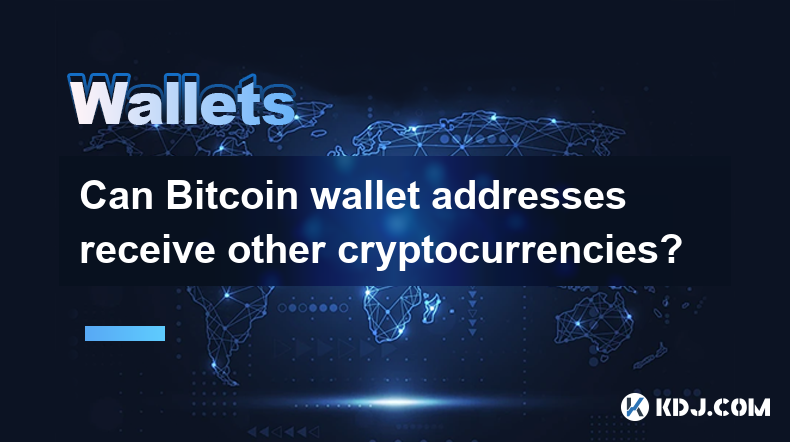
Key Points:
- Bitcoin wallet addresses are specifically designed for Bitcoin (BTC).
- Attempting to send other cryptocurrencies to a Bitcoin address will result in irreversible loss of funds.
- Different cryptocurrencies use different blockchain networks and addresses.
- To receive various cryptocurrencies, you need separate wallets for each cryptocurrency.
- Using the correct address is crucial for successful cryptocurrency transactions.
Can Bitcoin Wallet Addresses Receive Other Cryptocurrencies?
The short answer is a resounding no. Bitcoin wallet addresses are designed exclusively for Bitcoin transactions. They are linked to the Bitcoin blockchain, a separate and distinct network from those used by other cryptocurrencies like Ethereum, Litecoin, or Dogecoin. Each cryptocurrency operates on its own unique blockchain, requiring specific addresses for transactions.
Think of it like postal addresses. A Bitcoin address is like a specific address for a house only accepting Bitcoin packages. Sending a package intended for another house to that Bitcoin address won't work; the package will simply get lost. Similarly, sending Ethereum to a Bitcoin address will result in the loss of your Ethereum. There is no mechanism for the Bitcoin network to recognize or process other cryptocurrencies.
The fundamental reason for this incompatibility lies in the cryptographic underpinnings of each blockchain. Bitcoin addresses are generated using Bitcoin's specific cryptographic algorithms. These algorithms are not compatible with those used by other cryptocurrencies. Therefore, attempting to send any other cryptocurrency to a Bitcoin address will lead to an unsuccessful transaction, and more critically, the permanent loss of your funds.
This loss is irreversible. There's no way to recover the sent cryptocurrency. The blockchain is immutable; once a transaction is recorded, it cannot be reversed. This highlights the extreme importance of using the correct address for each cryptocurrency.
How to receive different cryptocurrencies?
To receive various cryptocurrencies, you must use wallets designed specifically for each cryptocurrency. For example, to receive Bitcoin, you need a Bitcoin wallet. To receive Ethereum, you need an Ethereum wallet, and so on. Many cryptocurrency exchanges offer wallets, but you can also use independent wallet software or hardware wallets.
- Choose a reputable cryptocurrency exchange or wallet provider: Research and select a platform with a strong security record and positive user reviews.
- Create separate wallets for each cryptocurrency: Do not attempt to consolidate different cryptocurrencies in a single wallet. This is crucial to avoid irreversible loss of funds.
- Verify the address before sending: Always double-check the recipient's address before confirming any cryptocurrency transaction. A single character error can lead to irreversible loss of funds.
- Understand the fees involved: Cryptocurrency transactions involve network fees (gas fees for Ethereum, for example). These fees vary depending on network congestion.
Using multiple wallets, each designed for a specific cryptocurrency, is the only secure and reliable way to manage and receive different digital assets. The use of incorrect addresses is a common mistake leading to substantial losses. Therefore, meticulous care is essential.
What are the consequences of sending the wrong cryptocurrency to a Bitcoin address?
The consequences are severe and final. The transaction will fail, and your funds will be lost permanently. The cryptocurrency network will not recognize the address as valid, and your digital assets will be irretrievably gone. There is no recovery process for such errors. The blockchain's immutability prevents any reversal of the transaction. This underscores the critical need for caution and verification when handling cryptocurrencies.
How do I avoid this mistake?
The best way to avoid sending the wrong cryptocurrency to a Bitcoin address is to be meticulous and attentive. Always double-check the recipient's address against the cryptocurrency you are sending. Many wallets provide warnings if you're attempting to send the wrong cryptocurrency to an incompatible address. Pay close attention to these warnings. Use separate wallets for each cryptocurrency to minimize confusion and risk.
Frequently Asked Questions:
Q: Can I use a single wallet for all my cryptocurrencies?
A: No. It is strongly advised against. Each cryptocurrency has its own blockchain and address format, requiring specific wallets. Using a single wallet for multiple cryptocurrencies significantly increases the risk of sending funds to the wrong address and losing them permanently.
Q: What happens if I send Litecoin to a Bitcoin address?
A: The Litecoin will be lost permanently. The transaction will fail, and there's no way to recover the Litecoin.
Q: Are there any recovery options if I send the wrong cryptocurrency to a Bitcoin address?
A: No. Once the transaction is confirmed on the blockchain, it cannot be reversed. The funds are irretrievably lost.
Q: How can I verify the address before sending cryptocurrency?
A: Carefully compare the address you're sending to with the recipient's address, paying close attention to each character. Many wallets provide warnings if you're attempting to send to the wrong type of address.
Q: What are the best practices for managing multiple cryptocurrencies?
A: Use separate wallets for each cryptocurrency. Double-check addresses before sending. Keep your wallet security keys safe and secure. Regularly back up your wallets. Only use reputable exchanges and wallet providers.
Disclaimer:info@kdj.com
The information provided is not trading advice. kdj.com does not assume any responsibility for any investments made based on the information provided in this article. Cryptocurrencies are highly volatile and it is highly recommended that you invest with caution after thorough research!
If you believe that the content used on this website infringes your copyright, please contact us immediately (info@kdj.com) and we will delete it promptly.
- 2025-W Uncirculated American Gold Eagle and Dr. Vera Rubin Quarter Mark New Products
- 2025-06-13 06:25:13
- Ruvi AI (RVU) Leverages Blockchain and Artificial Intelligence to Disrupt Marketing, Entertainment, and Finance
- 2025-06-13 07:05:12
- H100 Group AB Raises 101 Million SEK (Approximately $10.6 Million) to Bolster Bitcoin Reserves
- 2025-06-13 06:25:13
- Galaxy Digital CEO Mike Novogratz Says Bitcoin Will Replace Gold and Go to $1,000,000
- 2025-06-13 06:45:13
- Trust Wallet Token (TWT) Price Drops 5.7% as RWA Integration Plans Ignite Excitement
- 2025-06-13 06:45:13
- Ethereum (ETH) Is in the Second Phase of a Three-Stage Market Cycle
- 2025-06-13 07:25:13
Related knowledge
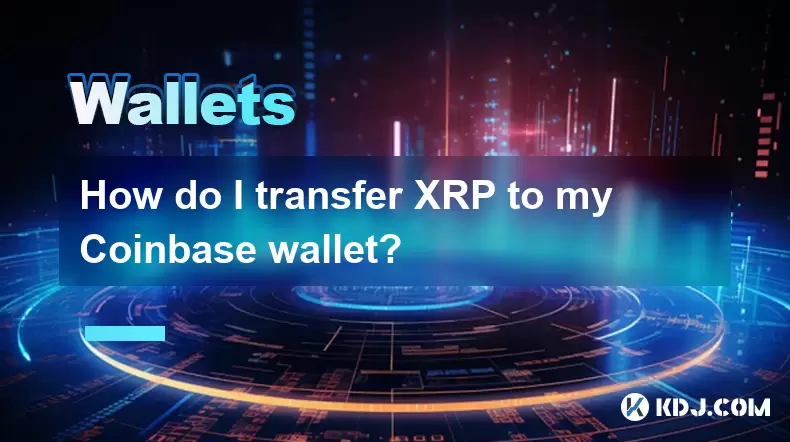
How do I transfer XRP to my Coinbase wallet?
Jun 16,2025 at 04:57pm
Understanding the Basics of XRP and Coinbase CompatibilityBefore initiating any transfer, it’s essential to confirm whether Coinbase supports XRP. As of recent updates, Coinbase has resumed offering XRP trading services on its platform after a period of uncertainty due to legal issues involving Ripple Labs. However, availability may vary depending on yo...

How do I deposit BNB into my Trust Wallet?
Jun 15,2025 at 03:56pm
Understanding BNB and Trust Wallet CompatibilityBefore initiating a deposit, it’s crucial to understand what BNB is and how it interacts with Trust Wallet. BNB (Binance Coin) is a utility token created by the Binance exchange. It can be used for paying transaction fees, participating in token sales, and more. Trust Wallet, on the other hand, is a mobile...
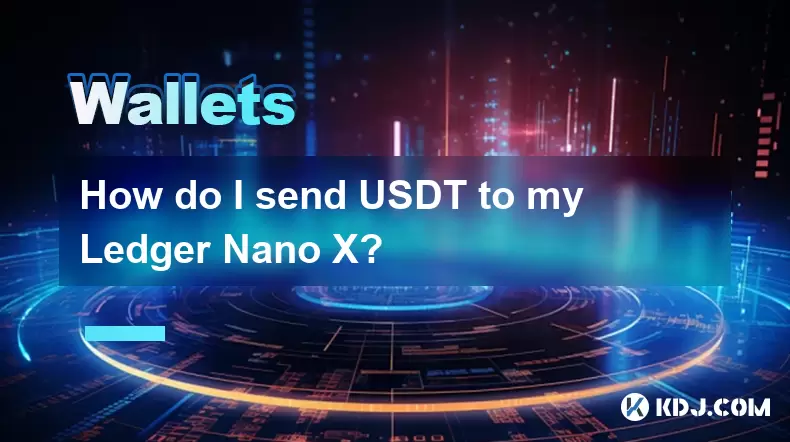
How do I send USDT to my Ledger Nano X?
Jun 15,2025 at 06:28am
What is USDT and Why Use Ledger Nano X?USDT, also known as Tether, is one of the most widely used stablecoins in the cryptocurrency ecosystem. It operates on various blockchain networks such as Ethereum (ERC-20), Tron (TRC-20), and others, offering users a digital asset pegged 1:1 to the US dollar. When it comes to storing USDT securely, hardware wallet...
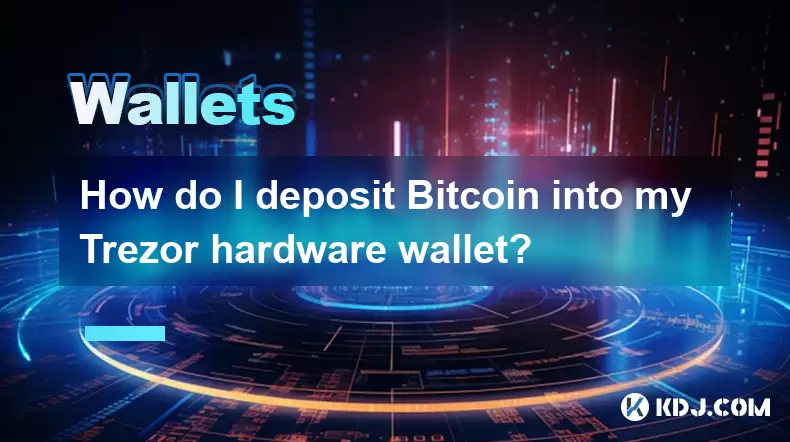
How do I deposit Bitcoin into my Trezor hardware wallet?
Jun 14,2025 at 12:29pm
What is a Trezor Hardware Wallet?A Trezor hardware wallet is a secure device designed to store cryptocurrencies offline, protecting them from online threats. Unlike software wallets, which are vulnerable to hacking and malware, Trezor stores private keys on the physical device itself. This ensures that transactions can only be approved by physically int...
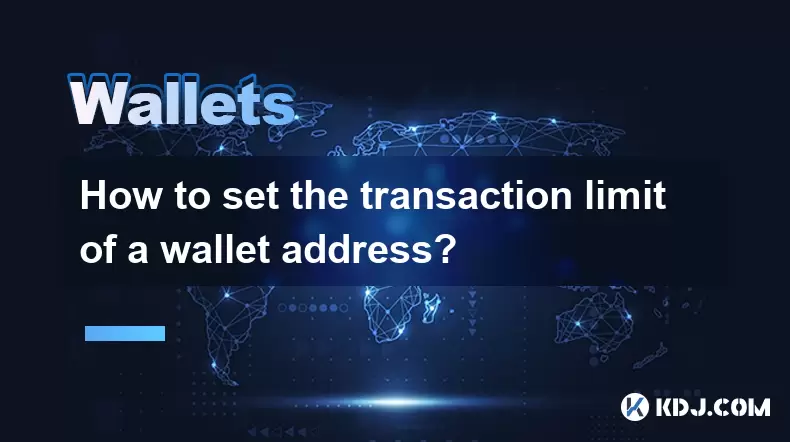
How to set the transaction limit of a wallet address?
Jun 16,2025 at 04:08am
Understanding the Concept of Transaction Limits in Cryptocurrency WalletsIn the cryptocurrency ecosystem, transaction limits refer to predefined restrictions placed on the amount of digital assets that can be sent or received by a wallet address within a specified timeframe. These limits are typically enforced by platforms such as exchanges, custodial w...
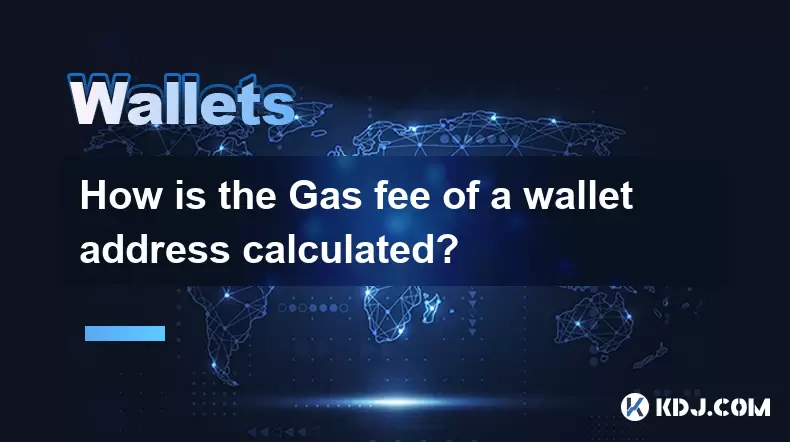
How is the Gas fee of a wallet address calculated?
Jun 14,2025 at 07:57pm
Understanding the Basics of Gas Fees in Blockchain TransactionsIn the cryptocurrency ecosystem, particularly within Ethereum-based networks, a Gas fee is an essential component of executing transactions or smart contract operations. The Gas fee serves as compensation for miners or validators who process and confirm transactions on the blockchain. It is ...

How do I transfer XRP to my Coinbase wallet?
Jun 16,2025 at 04:57pm
Understanding the Basics of XRP and Coinbase CompatibilityBefore initiating any transfer, it’s essential to confirm whether Coinbase supports XRP. As of recent updates, Coinbase has resumed offering XRP trading services on its platform after a period of uncertainty due to legal issues involving Ripple Labs. However, availability may vary depending on yo...

How do I deposit BNB into my Trust Wallet?
Jun 15,2025 at 03:56pm
Understanding BNB and Trust Wallet CompatibilityBefore initiating a deposit, it’s crucial to understand what BNB is and how it interacts with Trust Wallet. BNB (Binance Coin) is a utility token created by the Binance exchange. It can be used for paying transaction fees, participating in token sales, and more. Trust Wallet, on the other hand, is a mobile...

How do I send USDT to my Ledger Nano X?
Jun 15,2025 at 06:28am
What is USDT and Why Use Ledger Nano X?USDT, also known as Tether, is one of the most widely used stablecoins in the cryptocurrency ecosystem. It operates on various blockchain networks such as Ethereum (ERC-20), Tron (TRC-20), and others, offering users a digital asset pegged 1:1 to the US dollar. When it comes to storing USDT securely, hardware wallet...

How do I deposit Bitcoin into my Trezor hardware wallet?
Jun 14,2025 at 12:29pm
What is a Trezor Hardware Wallet?A Trezor hardware wallet is a secure device designed to store cryptocurrencies offline, protecting them from online threats. Unlike software wallets, which are vulnerable to hacking and malware, Trezor stores private keys on the physical device itself. This ensures that transactions can only be approved by physically int...

How to set the transaction limit of a wallet address?
Jun 16,2025 at 04:08am
Understanding the Concept of Transaction Limits in Cryptocurrency WalletsIn the cryptocurrency ecosystem, transaction limits refer to predefined restrictions placed on the amount of digital assets that can be sent or received by a wallet address within a specified timeframe. These limits are typically enforced by platforms such as exchanges, custodial w...

How is the Gas fee of a wallet address calculated?
Jun 14,2025 at 07:57pm
Understanding the Basics of Gas Fees in Blockchain TransactionsIn the cryptocurrency ecosystem, particularly within Ethereum-based networks, a Gas fee is an essential component of executing transactions or smart contract operations. The Gas fee serves as compensation for miners or validators who process and confirm transactions on the blockchain. It is ...
See all articles

























































































